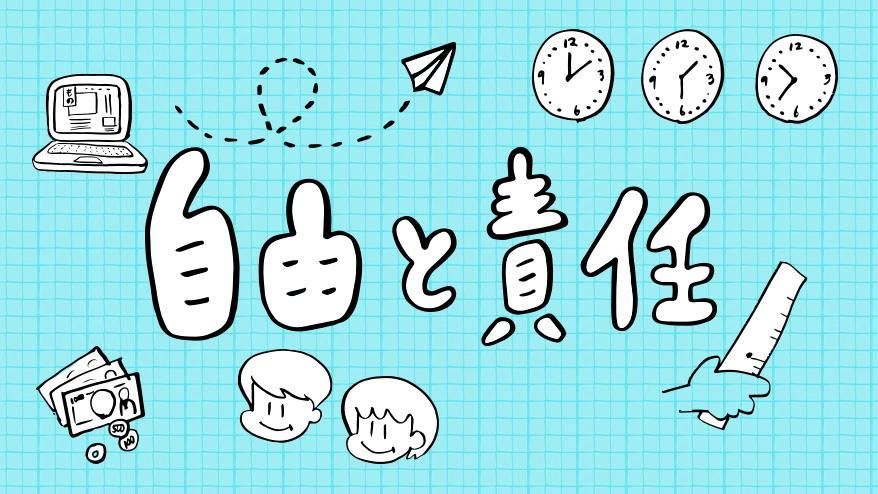The full flex system started in January 2017. Until then, there were fixed working hours (10:00-19:00), but since the start of the full flex system, as long as the monthly working hours are 168 hours, employees are free to come in and leave at any time. They can also decide their own days off.
Many people have commented that this has given them more freedom in their time, but at the same time, we have also heard some complaints that it has caused problems. Even among members of the same company, it seems that each person has different opinions about the system and the problems they face depending on their perspective, position, and the work they are responsible for.
In order to hear as many of these individual voices as possible and identify areas for improvement in the system, we conducted an internal survey to find out what impact the full flex system is having on members and the company.
The questions cover a wide range of topics, from work hours and how to take time off, changes in working and living styles, to issues with the system. The questions are mainly open-ended, so that employees can explain in their own words what changes have occurred as a result of the introduction of the full flextime system, how they feel about it, and what actions they are taking.
This article presents the results of that survey. The results have been lightly edited to provide an unbiased, concrete account of both the good and bad aspects of the experience for each member.
We hope that the results of our survey will serve as a useful case study for people who are considering full flextime, people who are curious about what kind of working styles other IT companies have, people who tend to work a lot of overtime and want to change their working style, and people who are exploring diverse working styles, and for anyone who is facing some kind of challenge regarding working style or how they use their time.
Survey INDEX
- Since the full flextime system began, have your working hours or the way you take time off changed?
- How do you schedule your working hours and days off?
- What changes have you noticed or what are your thoughts after trying Full Flex?
- Why do you feel like nothing has changed even though you have started full flex?
- Are there any special techniques you have taken at work or in your personal life to accommodate your current work rhythm?
- What efforts have you made to fit into your current work rhythm?
- Have you been influenced by the fact that people on your team, department or in your work use FullFlex?
- What are your own influences?
- What changes has full flex brought about in your team, department, or company as a whole?
- Are there any areas that could be improved regarding the current full flex system?
- Any other thoughts about the full flex system?
Survey results
* Response rate: 95% (60 out of 63 respondents)
Q1. Since the full flextime system began, have your working hours or the way you take time off changed?
(Number of responses: 58)
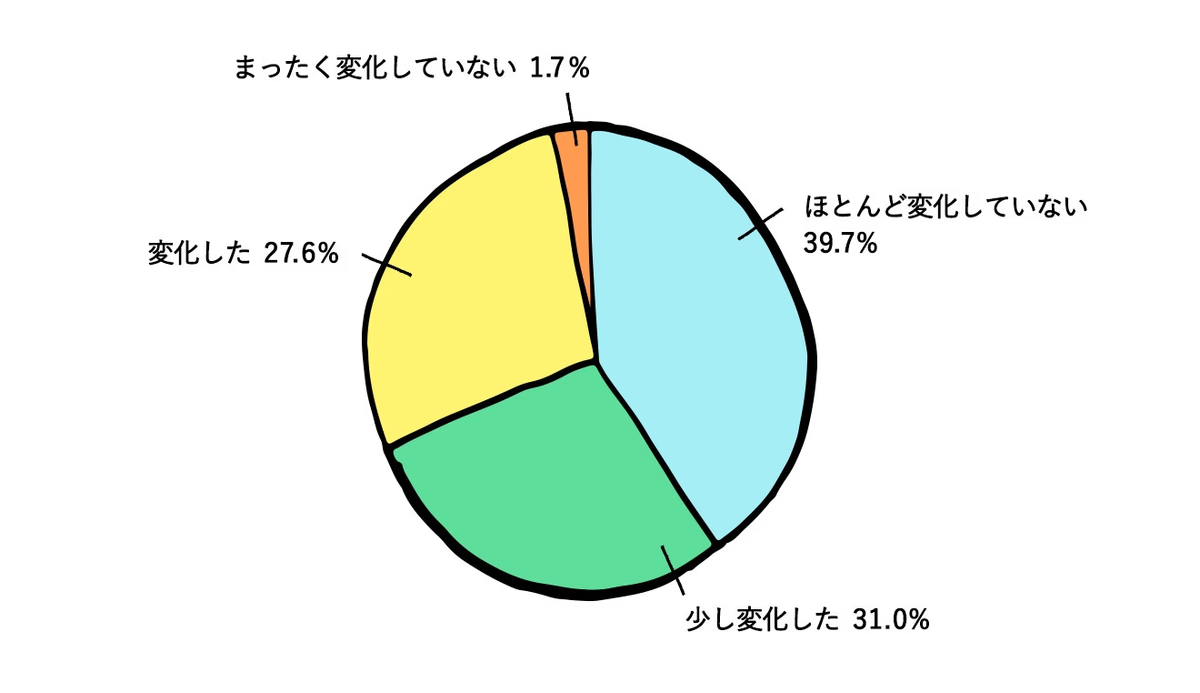
Q2. How do you set your working hours and days off?
(For those who answered "Changed" or "Slightly changed" in Q1)
summary :
Everyone has their own way of setting work hours and holidays. Some people come to work at their leisure, while others come in on the first train and go home at 2 p.m. Some people want to work longer hours a day and have more days off, while others want to shorten their work hours even if it means reducing the number of days off. How people set their work hours varies based on their values and lifestyles.
2-1. What is your average time to and from work? (37 responses)
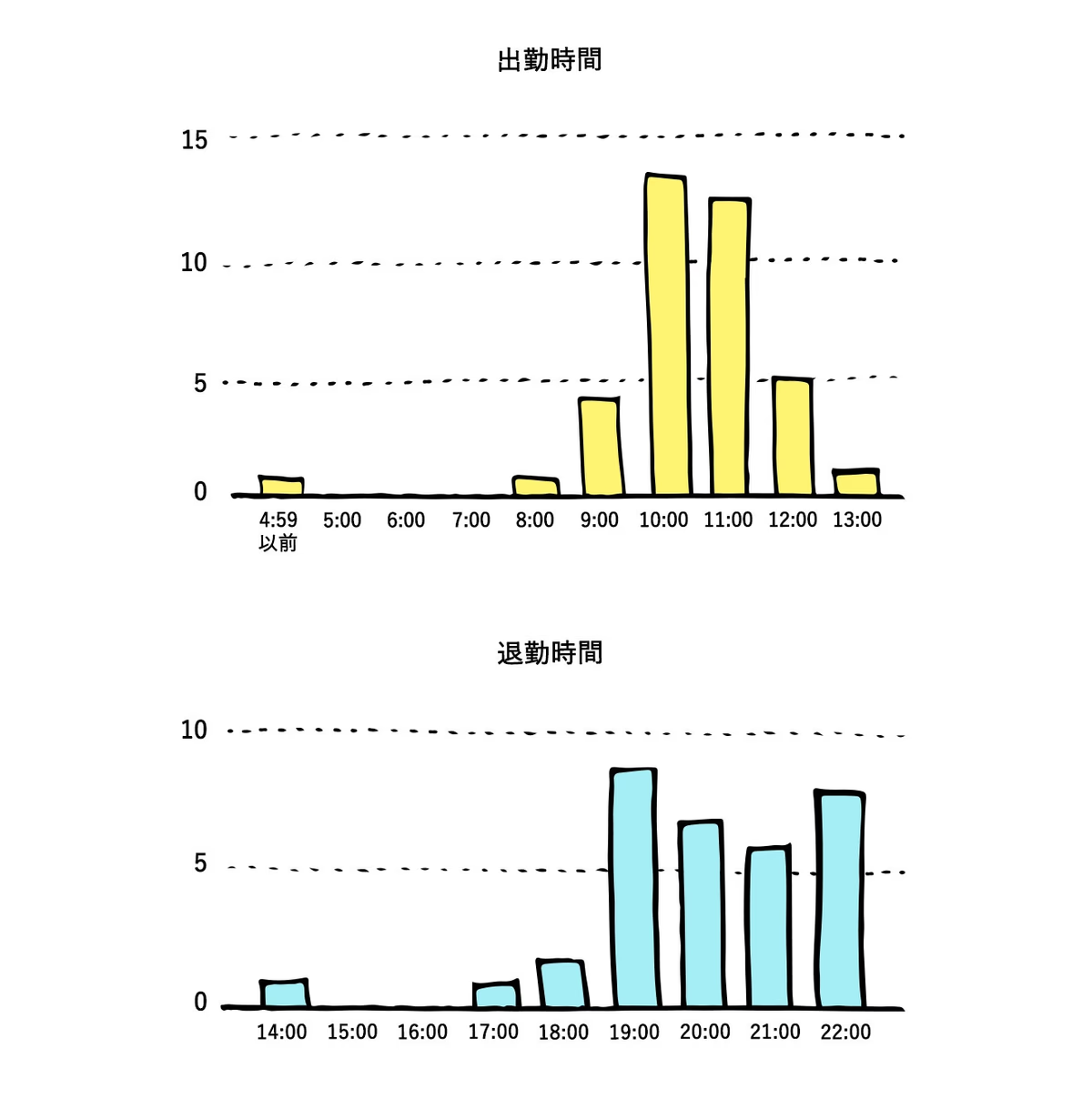
2-2. How do you usually take time off?
(43 responses from people who answered "changed" or "slightly changed" in Q1)
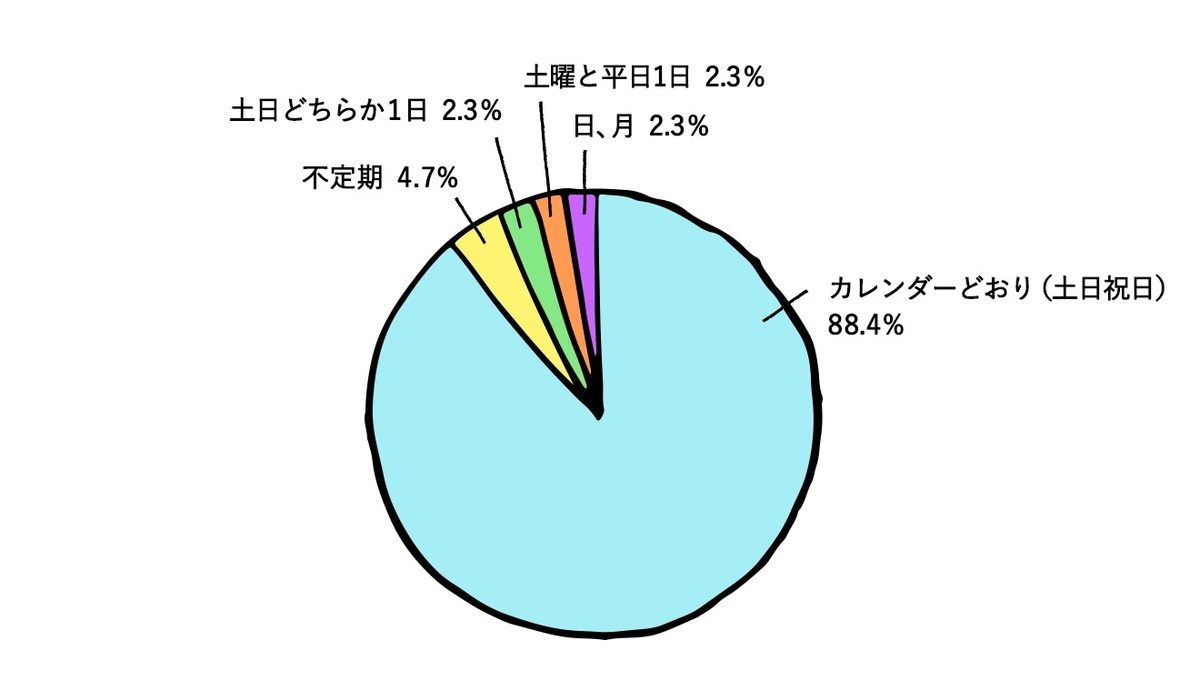
2-3 What kind of rhythm do you work at? (Open-ended)
Relaxed commute to work
- Arriving at work settled down to around 10:15-10:20. Leaving work at around 19:00-20:00 remained unchanged.
- I try not to ride crowded trains. If I oversleep, I go to work around noon.
Early departure or weekday off pattern
- On Tuesdays, I leave work at 5pm.
- I take Mondays off every week and go to work on either the Saturday or Sunday.
Various patterns
- I change my arrival time to the office depending on the related department or client of the project.
- I either come to work early in the morning or after 1pm.
Adjusting when you're busy
- If there is a lot of overtime work, set aside days off.
- Once a big project is finished, take as much time off as possible and reduce your working hours.
No particular change
- I follow a calendar to match the holidays of those around me.
- Since we have a lot of interactions with people outside the company, we will basically maintain the previous working hours of 10:00-19:00.
Q3. What changes have you noticed or what are your thoughts after trying Full Flex?
(For those who answered "Changed" or "Slightly changed" in Q1)
summary:
Many people commented that being able to adjust their commute times and days off has improved their health and increased communication with their families.
It also appears to reduce the stress of commuting, as people no longer have to force themselves onto crowded trains during rush hour.
In addition, at the same time that the full flextime system was introduced, overtime, which had not been properly managed before, began to be managed as well, and more people are becoming more conscious of time when they work.
Answer (free response)
Changes in how we use time at work
- When work is progressing ahead of schedule, I change my working hours depending on the progress.
- The number of hours varies depending on the amount of work the next day.
- I appreciate that even if I work early in the morning it still counts as working hours.
- By delaying arrival at work to coincide with the people involved in the project, we were able to reduce unnecessary work.
- Since I started working full-time, I've started thinking more about overtime pay.
Changes in your personal life
- I used to miss my family during the week, but by aligning our schedules, we are able to communicate better than before and our relationship has improved.
- I go to work after finishing whatever I wanted to do in the morning (such as housework).
Changes in physical condition and health
- It's good to be able to work according to one's physical condition (I personally feel better in the afternoon).
- It's good because you can manage your health and your own schedule, such as by adjusting your attendance at work the day after working overtime, or by leaving work if you finish early.
- I was able to overcome my lack of sleep and poor health issues and work in top condition.
- Commuting has become more comfortable as I no longer have to ride crowded trains.
- As a result, I'm getting home late and I feel that it's bad for my health.
Q4. Why do you feel like nothing has changed even after starting full flex?
(For those who answered "Hardly changed" or "No change at all" in Q-1-1)
summary:
While some people felt that things had changed, about 40% answered that things had not changed. The reasons cited included that the regular working hours (10:00-19:00) before the introduction of the full flextime system were just right, that full flextime was difficult to use due to work circumstances, and that they could not manage their own work hours in the first place.
Answer (free response)
No need to change
- I don't want to change my habits, so I basically go to work at the same time as before.
- I tried coming to work during the day, but I found that 10:00-19:00 suited me better.
- If I change my rhythm, I get sick and my work doesn't go well.
- Because I can't control my work hours yet.
Due to work reasons
- Since we are based at the client's premises, we need to adjust to their time zone.
- Because we have to give instructions to members (part-time workers) who are not included in the full-time group.
- There are so many internal and external meetings that it is difficult to make use of it.
- Because there is no atmosphere in my department that allows me to take advantage of full-time work.
- If I come early I can't leave early, and if I come late I won't be able to finish my work.
Q5. Are there any special efforts you have made in your work or personal life to accommodate your current work rhythm? (Number of responses: 58)
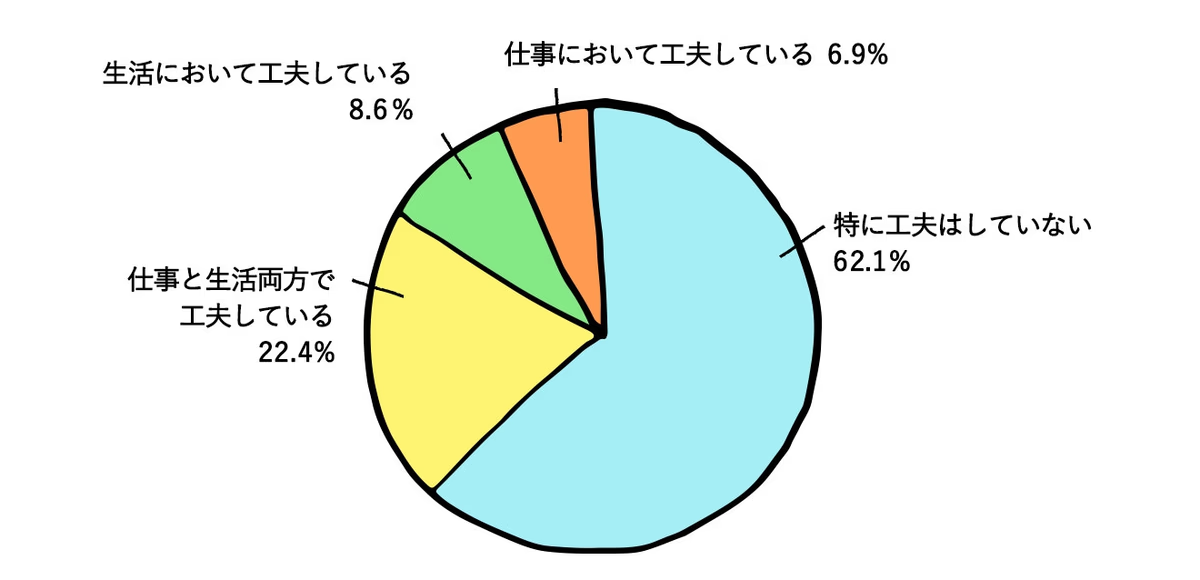
Q6. What efforts have you made to maintain your current work rhythm?
(For those who chose "I'm making efforts at work," "I'm making efforts in my daily life," or "I'm making efforts in both work and daily life" in Q5)
summary:
About 80% of people answered that they have made some kind of effort. In terms of work, it seems that they are paying attention to communication with others, such as making efforts to understand each other's schedules and carefully explaining things to team members and customers. In terms of lifestyle, many people said that they are making efforts to regulate their daily rhythms, such as eating and sleeping. It seems that people are becoming more aware of the correlation between a regular rhythm of life and a regular rhythm of work.
Answer (free response)
Work-related innovations
- I became more conscious of coming in early and leaving early, and started thinking more about efficiency.
- I plan my day in terms of tasks rather than hours.
- We will focus on the first half of the day and then adjust the time so that employees have more time to work in the second half.
- I keep track of the team's schedule and make sure to make careful adjustments where appropriate.
- If you have personal commitments and will be leaving early, make sure other people know on your calendar.
- I have informed my clients that my work hours will change and have received their approval.
- We try to minimize external influences as much as possible, for example by speeding up our work from 7:00 p.m. onwards, when contact from customers decreases.
Lifestyle Improvements
- It is because of this freedom that I have begun to think about getting a regular routine in my life.
- I try to wake up at 6:00 and make sure I have a proper morning schedule.
- I'm watching what I eat. I've felt better since I started eating a vegetable-based diet.
Work and life improvements
- Look at the big picture in both work and life, decide what needs to be done, and then carry it out.
- If you spend time on personal activities during the week, work on the weekends to make up for it.
Q7. Have you been influenced by the fact that people on your team, department, or at work use FullFlex?
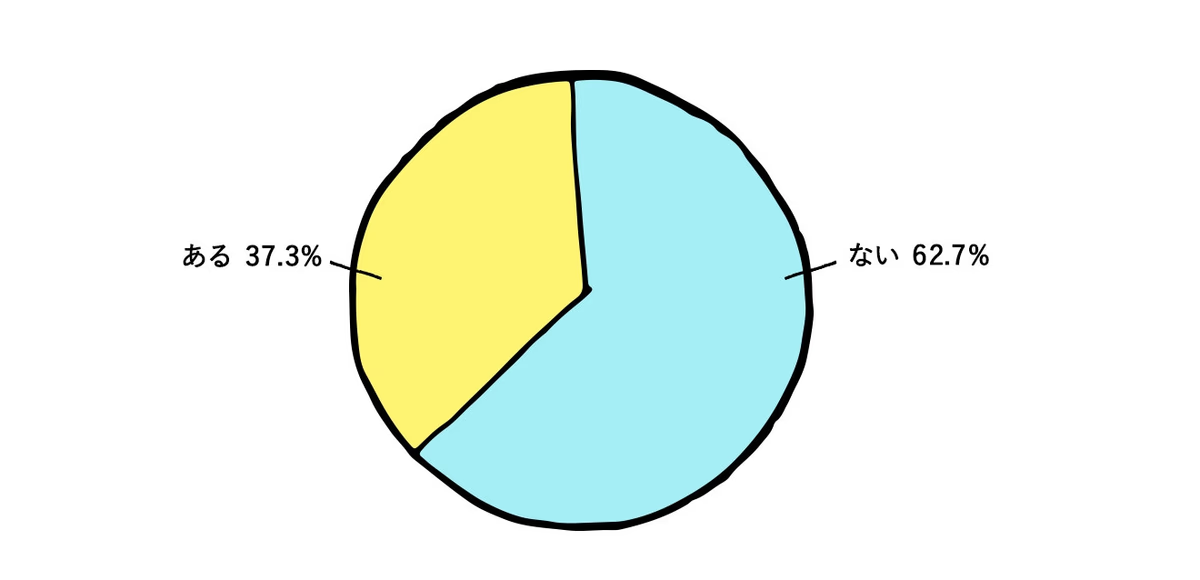
Q8. What are your personal influences?
(For those who answered "Yes" to Q7)
summary:
We asked the 37% of people who answered that using full flextime has had an impact on them what specific changes have occurred. Some people said that their work load has increased, such as the workload of those who take the first calls and the workload of team management, and some said that they feel lonely because they have fewer opportunities to see each other because they have different working hours. On the other hand, there were also positive comments such as more people are working efficiently and seem healthier, and work efficiency has improved.
Answer (free response)
Increase efficiency
- With fewer people looking unwell, it's become easier for everyone to work together.
Load increases
- Since I have to check everyone's schedules, it takes more coordination work.
- If the other person is not there and work cannot progress, there is no point in coming to work early, which is a problem.
- After other members leave early, work requests come in and I have to work overtime to deal with them.
Telephone correspondence is difficult
- I'm not sure how to respond when I receive a call from someone whose arrival time at work is unknown.
- Some people frequently change their scheduled arrival time at work, so it is common that when a customer calls back at the time they have told the person, they are not there again.
- If I come to the office during times when there are fewer people around, I'll be busy answering phone calls, from small things like "Will Mr./Ms. XX come today?" to "I need you to do this urgently."
- I feel like sometimes customer service is slow.
Q9. What changes has full flex brought about in your team, department, or company as a whole?
summary:
When asked what changes have occurred in teams, departments, and the company as a whole since the start of full flextime, it emerged that production staff, who have easy control over their time, are relatively able to use full flextime, while those who work in teams or directly with clients are not so likely to use it. There was also a point made that it is unfair that people who come to work later receive more overtime pay. While many people said that the atmosphere in the company has generally improved, there were also voices saying that there are fewer opportunities to meet face-to-face and communication tends to decrease.
Answer (free response)
Full-flexibility differences based on work content
- It is easy to utilize for production (coders and designers), but directors and checkers who deal with customers a lot do not benefit much from it.
Awareness of time
- We have become more respectful of each other's time (privacy).
- It has become clear that each person works at a different time, either morning or afternoon type.
- "I worked x hours, so I have x days off this month!" has become a common conversation topic.
- There has been a growing bias towards those who have time to do things at their leisure and those who rush around at the last minute.
- The results are clearly different depending on whether or not you plan things and how you use your time. There are people who can use the system (tools) well and people who can't.
Attitude towards overtime
- I became more conscious of working overtime and started going home earlier.
- We have more opportunities to concentrate and work together, saying, "Let's finish quickly and leave early!"
- I don't think it's good to come to work late and work overtime until after 22:00. (Late-night overtime after 22:00 is prohibited in principle.) I understand that some people are not good at mornings or are night owls, but if you can't follow the not-so-difficult rule of working between 5:00 and 22:00, it seems like you're disregarding the rule itself.
- Overtime pay is higher for late-night work, but I don't understand why someone who comes in late and stays late should get paid more than someone who comes in early, works efficiently, and leaves early.
Company atmosphere
- Fewer people are taking time off due to illness. It feels like everyone is more energetic.
- Fewer people look sleepy. Fewer people fall asleep at work.
- I feel a little lonely because I have fewer opportunities to meet other people face to face.
Q10. Are there any areas that need improvement regarding the current full-flex system?
summary:
This question elicited a variety of opinions from a variety of perspectives.
In the full flextime system, the prerequisite is that employees work more than 168 hours a month, even though they have more flexible working hours. This does not change during months with many holidays or the New Year holidays, so even if employees work 5 days a week and 8 hours a day (the same as when there are regular working hours), they still do not reach 168 hours a month. New employees have few paid vacation days, so it can be difficult to make up for lost time. For this reason, there have been calls for improvements to the 168-hour rule.
There were also concerns that people who cannot manage their own time would use full flextime. There were suggestions for measures to improve literacy about the system, and questions about whether all employees need to have full flextime in the first place. On the other hand, there were also comments that it is unnatural for part-time workers not to have full flextime.
Other systems in the company have also been affected. One of them is the long-standing morning assembly system. Now, with the start times of the workdays all varying, the meetings are not so good, and there are questions about whether the system is even necessary and whether there are other ways to do it.
There are minority opinions, such as those who would like to work late at night because they do not need overtime pay, and those calling for working from home, so it seems that we need to consider to what extent we should expand diverse working styles.
Answer (free response)
Regarding regular working hours (168 hours)
- I wish the 168h restriction would be lifted.
- It would be nice if I could carry over any time exceeding 168 hours to the next month.
- If we can achieve good results and get to a point where 168h or less is OK, I think we'll be able to be more efficient.
- During the year-end and New Year holidays and other months with many public holidays, 8 hours worked on weekdays is not enough to reach 168 hours, and so I need to make up for it with paid leave, so I would like the standard working hours to be changed each month.
Self-management
- It's annoying when people don't write their working hours on the calendar; I wish this would be enforced.
- It's important not only to input your schedule, but also to talk to those around you.
- It is important to have the discretion, such as not telling customers that full refreshments are a given.
- There are people who don't show up to morning assembly even though they're on duty, so I think we should come up with some kind of solution.
- I feel that it is dangerous for people who cannot manage themselves to be on full flextime.
Full Flex Scope
- Employees are automatically on full-time employment, but I think it would be nice if there were some steps to take in order to use it.
- If possible, I would like the system to be introduced for part-time workers as well.
- I think it's unnatural that part-time workers are required to attend morning meeting since they start work at 10:00.
others
- I think it would be better to have a core time.
- I think it is necessary to create some rules for each team.
- I think it would be useful if there was an app that let you see at a glance when everyone is working.
- I would like to be able to work late at night (without having to pay extra overtime).
- How about introducing remote work? If you say "manage your work and life by yourself," I think it would be good to allow working from home under certain conditions.
Q11. Any other thoughts about the full flex system?
- There is no more unnecessary work being done and I think productivity has improved considerably.
- I think it's good because it makes it easier to balance work and life.
- If it doesn't have a negative impact on the company's bottom line, I'd love for them to continue.
- In order to maintain this system, we must follow the rules (such as communicating working hours).
- I feel like it suits Monosus, but how it is used varies from person to person.
- Looking around my own department, the current situation is that there are very few people who are actually making use of it.
- I want to see more people who are productive with their time.
- Since this directly reflects each individual's awareness and attitude toward their work and life, it is difficult to decide how in-depth the guidance should be.
Observations:
My freedom and your freedom
The future of "being together"
The full flextime system has changed the way people approach the company. Thinking about the hours they work has become a system that affects not only the way they work, but also how they use their private time, how they spend time with their family, and even their health. Some people are enjoying full flextime, while others feel that their work load has increased, some feel that the atmosphere at work has improved, and some feel lonely because communication has decreased. The survey results show that people see things differently depending on their position.
As freedom in working styles has increased, it can also clash with other freedoms. There seem to be some clashes occurring, such as "I wish they'd let me know in advance if they changed the schedule" or "When you come to work later, it puts a bit more strain on us," even if they're not stated directly.
How do we respect each other's freedoms? In order to continue this system, we need to carefully consider this issue.
After the results of this survey were announced, a working group called the "Full Flex System Improvement Committee" was established to address the issues that emerged.
At the first workshop, Representative Hayashi, who was serving as facilitator, began by saying, "The purpose of this meeting is to create a sense of belonging."
"Iriau" is a word used by Toek, an NPO that runs a free school in Anan City, Tokushima Prefecture. "Iriai" does not mean "to compromise" by finding a compromise, but rather it means accepting each other and existing together.
Now that we have the freedom that the full flextime system has given us, can we find a way to "be there" for each other?
I would like to tell you about the progress at the next opportunity.
